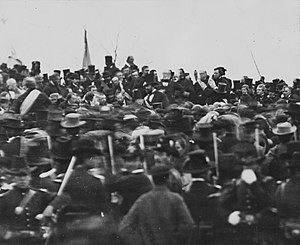But, anyway, anyway, I'm not writing about the wily & charming Man of Sorrows today. [For a fine discussion, though, of the historical aspects of the Film, there's a fine essay HERE.] Or the fact that today marks the 269th anniversary of the birth of frontier soldier, George Rogers Clark, as rugged & then some as his kid brother William, the explorer.
Or that James A. Garfield, US President No. 20, would have been 181 years old today if still another assassin hadn't shot him and his doctors had had a working knowledge of soap and germ theory.
Or that Teddy Roosevelt's youngest son Quentin, came into the world on this day in 1897, only to leave it twenty years later, a casualty of the air war over the Western Front.
Nope, not writing about any of that. Instead I wanted to tell you about hauling my sleep-deprived self out of bed way too early last Friday morning to go talk to some of the Missouri teachers attending their association's annual conference in Kansas City. Lucky for them, coming to MY session because they were informed to a fare-thee-well about our blog and about I.N.K., thanks to Vicki Cobb, bless her, sending me a pile o' pretty blue iNK Think Tank postcards. They rode in the heavy suitcase along with a thick stack of nonfiction picture books, including Jim Murphy's Blizzard, and Vicki Cobb's Open Your Eyes. These the teachers looked at [along with my handout sheet, introducing them to I.N.K. authors & their books ] and passed around while I gassed away at them about historical literacy [an excellent essay about that HERE. ] and about the uses of trade nonfiction books in the classroom [a far out essay about THAT HERE]. And most of all, I talked with them about the virtues of knowing history, despite the fact that some blockhead educational planners appear to deem such knowledge to be less important than math, reading, and writing, can you believe it? After all, what are people to read and write about; how are citizens to think and feel about their nation without a knowledge of what has been done before? The reasons decisions were made, actions were taken? By whom? To what ends?
After all history is no mere catalogue of factoids – although, let me tell you that I've been working on an historical Weird But True book for the National Geographic and I'm not suffering from a want of human weirdness. I mean, don't you love knowing that the fashionistas of medieval Japan painted their teeth black? That Hannibal of ancient Carthage snake-bombed his enemies with pots full of poisonous reptiles? That in 1415, when the Chinese emperor was confronted with his first sight of an African giraffe, he and his wise men identified it as a unicorn?
Anyway, anyway, history's more than a roster of battles and dead people's birthdays. It's the saga of human behavior, your basic cockeyed caravan of role models and cautionary tales. It's EVERYTHING, all that we have said and dared to do. It's a "guide to navigation in perilous times," so said David McCullough. "History is who we are and why we are the way we are."
And it's a boatload of stories: Of TR whispering "Poor Quinnikins," on hearing that his youngest had been shot down behind enemy lines in the summer of 1918. That the old lion of an ex-president/soldier/explorer died not long after of hard living and a broken heart. Of his old political enemy, big-bellied Wm. Howard Taft, weeping in the cold by TR's grave.
Of James A. Garfield surviving a fatherless, poverty-stricken childhood to become a college president by the time he was 26 years old.
Of Colonel George Rogers Clark leading his half-starved Kentucky "Long Knives" through chest-deep icy water, on their Kaskaskia>Vincennes campaign, 1778-79.
Excellent movie fodder, Mr. Spielberg.


1 comment:
Cheryl, Great post! Glad you brought up this movie. I thought it was wonderful but my take-away was to wonder how much of it was true. Since I'm not an historian, I'm glad of these resources to help sort it out.
Post a Comment